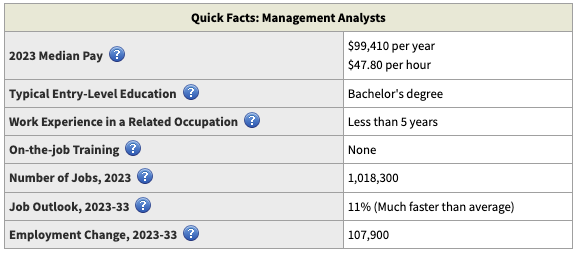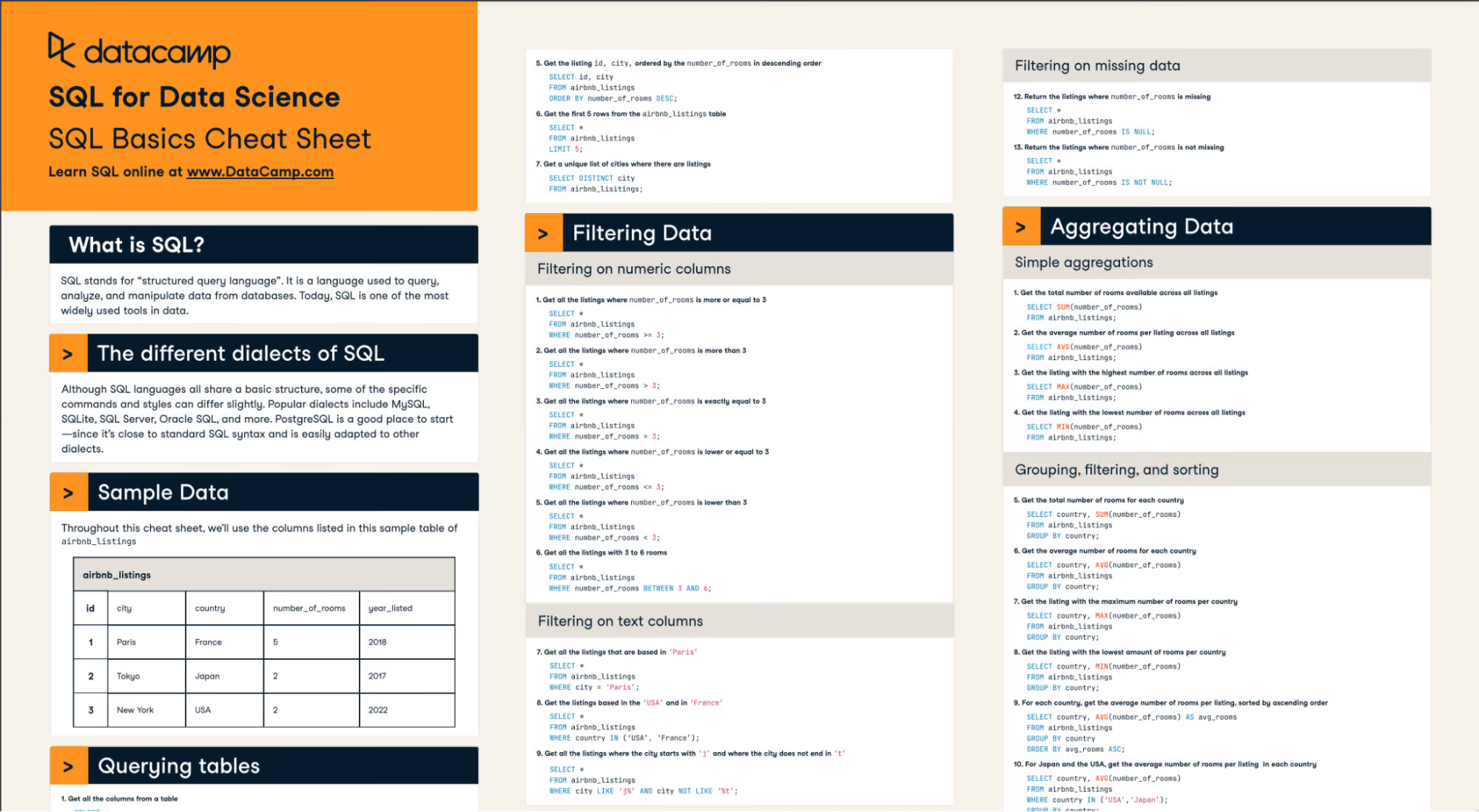Track
The role of a business analyst (BA) has become increasingly vital in today’s data-first world. BAs act as the bridge between business needs and technological solutions, ensuring that projects and initiatives align with the strategic goals of an organization. As reported by LinkedIn in 2024, with the growing complexity of business challenges, the demand for skilled business analysts is rising. One way to validate and enhance your skills in this domain in 2026 is by obtaining a business analyst certification.
A business analyst certification is a formal recognition of your expertise and skills in the field, potentially providing a competitive edge in the job market. It not only demonstrates your commitment to professional development but also ensures that you are up-to-date with the latest industry practices and methodologies.
In this guide, we will delve into the world of business analyst certifications, exploring the various options available, the benefits of becoming certified, and how DataCamp can help in your career journey.

A look at the job growth of management analysts in the US, including business analysts - source
What is a Business Analyst Certification?
A business analyst certification is a formal recognition from a professional body that validates your knowledge, skills, and competencies in the field of business analysis. It is a testament to your ability to bridge the gap between business needs and technological solutions, ensuring that projects align with the strategic goals of an organization. These certifications are designed to set industry standards and help professionals demonstrate their commitment to their careers and ongoing professional development.
Get certified in your dream Data Analyst role
Our certification programs help you stand out and prove your skills are job-ready to potential employers.

The Best Business Analyst Certifications
Selecting the right certification could be a pivotal decision in your career. Below is an in-depth look at some of the top certifications available, tailored to different experience levels.
Entry-level business analyst certifications
These certifications are perfect for those just starting out or looking to formalize their experience in business analysis.
1. ECBA (Entry Certificate in Business Analysis)
- Offered by: IIBA
- Suitable for: Novices in business analysis or professionals looking to transition into the field. No prior experience is required.
- Skills covered: Focuses on understanding business analysis principles, practices, and the role of a business analyst. It covers six knowledge areas, including business analysis planning, requirements elicitation, and solution evaluation.
- Cost: $195 for the exam ($350 for non-members) and $95/$250 for resits.
- Time to complete: Varies, but with dedicated study, candidates can prepare in a few weeks to a few months.
- Additional notes: This certification is a starting point that can help enhance your understanding of business analysis fundamentals.
2. PMI-PBA (Professional in Business Analysis)
- Offered by: PMI
- Suitable for: Project managers and business analysts who work on projects and programs. It is also suitable for other professionals who perform business analysis in their roles.
- Skills covered: Emphasizes the integration of business analysis practices with project management. Covers needs assessment, planning, analysis, traceability, monitoring, and evaluation.
- Cost: $405 - $555 for the exam, with additional costs for required training and resources. PMI members receive a discount.
- Time to complete: Preparation time varies, but candidates typically spend several months studying for the exam.
- Additional notes: This certification is recognized globally and aligns with PMI’s standards, ensuring a comprehensive understanding of business analysis in the context of projects and programs.
Mid-level business analyst certifications
These certifications are designed for professionals with some practical experience in business analysis.
3. CCBA (Certification of Capability in Business Analysis)
- Offered by: IIBA
- Suitable for: Business analysts with 2-3 years of practical experience. Requires a minimum of 3,750 hours of work experience in business analysis.
- Skills covered: Focuses on advanced documentation, effective planning, and solution evaluation. Covers the full spectrum of business analysis tasks.
- Cost: $145 for the application, plus $250 - $405 for the exam. Membership discounts may apply. Resits are $195-$350
- Time to complete: Candidates typically spend 3-6 months preparing, depending on their experience and study pace.
- Additional notes: This certification is globally recognized and is a way to validate your growing experience and skills in business analysis.
4. BCS Certificate in Business Analysis Practice
- Offered by: BCS
- Suitable for: Those with some practical experience in business analysis, looking to deepen their understanding and apply their skills in a strategic context.
- Skills covered: Focuses on strategic analysis, stakeholder management, and business system modeling. Provides a holistic view of business analysis.
- Cost: Approximately $500 - $1,500, including training and exam fees. Costs may vary based on training provider.
- Time to complete: Varies based on training schedule, but typically completed in a few weeks to a few months.
- Additional notes: This certification is well-regarded in the UK and internationally, providing a foundation for advancing your career in business analysis.
Advanced-level business analyst certifications
These certifications are for seasoned professionals looking to validate their extensive experience and expertise.
5. CBAP (Certified Business Analysis Professional)
- Offered by: IIBA
- Suitable for: Senior business analysts with a minimum of 7,500 hours of work experience and a deep understanding of business analysis principles.
- Skills covered: Advanced business analysis principles, practices, and the application of knowledge areas in real-world scenarios.
- Cost: $145 for the application, plus $350 - $505 for the exam. Membership discounts may apply. Resits are $295-450.
- Time to complete: Preparation time varies widely, but candidates typically spend 6-12 months studying.
- Additional notes: This prestigious certification is globally recognized and is considered a benchmark for senior business analysis professionals.
6. BCS International Diploma in Business Analysis
- Offered by: BCS
- Suitable for: Experienced business analysts looking to validate their extensive skills and knowledge. Requires a combination of certificates and a diploma project.
- Skills covered: Comprehensive coverage of business analysis best practices, techniques, and methodologies.
- Cost: Approximately $3,000 - $4,000, including training, exams, and diploma project. Costs may vary based on training provider.
- Time to complete: Varies widely, but typically 1-2 years of part-time study and project work.
- Additional notes: This diploma is highly regarded and provides a thorough validation of your business analysis skills and knowledge.
Related Certifications for Business Analysts
While business analysts focus on requirement gathering, process improvement, and stakeholder communication, data-driven decision-making is an increasingly valuable skill. Certifications in data analytics can complement a business analyst's expertise, making them more competitive in the job market.
DataCamp Data Analyst Certification
- Offered by: DataCamp
- Suitable for: Business analysts looking to strengthen their data analytics skills and leverage SQL, R, or Python to derive insights from data. Ideal for professionals who work with data-driven decision-making.
- Skills covered: Data management, exploratory analysis, statistical experimentation, data visualization, and business communication. Candidates must demonstrate proficiency in SQL and either R or Python.
- Cost: $25 per month (included in DataCamp’s Premium Membership).
- Time to complete: Certification must be completed within 30 days of registration. Most candidates prepare over a few weeks to a couple of months.
- Additional notes: This certification helps business analysts gain hands-on experience with data analysis and visualization—key skills for modern business intelligence roles. It includes two timed exams, a practical exam, and a shareable certification badge.
Business Analyst Certifications vs Certificates
It's crucial to understand the distinction between certifications and certificates, as they serve different purposes. Certifications typically require a combination of education, experience, and passing a comprehensive exam. They are often maintained through continuous learning and periodic re-certification. Certificates, on the other hand, are usually awarded after completing a course or series of courses and are often focused on acquiring specific skills.
The Benefits of Becoming a Certified Business Analyst
Becoming a certified business analyst is a strategic career move with numerous advantages. In our podcast exploring whether roles like data analyst and business analyst are dying out, Mo Chen, Data and Analytics Manager at NatWest Group, explains:
When you go into a business, the ability to solve business problems and identify them is so valuable. Common sense and intelligence are so underrated nowadays. Everybody's talking about implementing, implementing, implementing. But then imagine if you don't even know what questions to ask. You just go to work, and you literally have no clue what to look for. AI will not solve that problem for you because every business will have its own unique problems.
Mo Chen, Data & Analytics Manager at NatWest Group
Evidently, the demand for people with certification in areas like business and data analysis will still be in demand, even in this era of AI.
Here’s a deeper dive into the key benefits:
Enhanced skills and knowledge
Certifications are designed to ensure that you are proficient in the latest tools, techniques, and best practices in business analysis. They provide a structured learning path, helping you to systematically enhance your skills and knowledge. This continuous learning process ensures you stay ahead in your field, ready to tackle complex business challenges effectively.
Increased credibility
Holding a certification clearly demonstrates your commitment to your career and professional development. It shows employers, colleagues, and clients that you are dedicated to maintaining high standards in your work. This increased credibility can open doors to new opportunities and strengthen your position in the industry.
Greater employment opportunities
In today’s competitive job market, certifications can give you an edge. Many employers look for certified professionals when hiring, as it assures them of your capabilities and dedication to the field. This preference for certified individuals can lead to greater employment opportunities and job security.
Potential for higher earnings
Investing in a certification can have a direct impact on your earning potential. Certified business analysts could command higher salaries compared to their non-certified peers. This is a reflection of their proven skills and the value they bring to an organization. Learn more about business analyst salaries in a separate article.
Professional network expansion
Certifications often come with membership to professional bodies and access to exclusive events, forums, and resources. This provides a unique opportunity to connect with like-minded professionals, learn from peers, and expand your professional network. These connections can be invaluable for knowledge sharing, career advice, and job opportunities.
Personal growth and confidence
The journey to becoming certified is a challenging one, requiring dedication and hard work. Successfully achieving a certification is a significant accomplishment that can lead to personal growth and increased confidence in your abilities. It validates your skills and demonstrates your capability to take on challenging roles in business analysis.

Resources such as our SQL cheat sheet can help with business analyst certification
How to Prepare for a Business Analyst Certification
If you’re planning on becoming a certified business analyst, you’ll need to put in the hard yards to reach your goal. Thankfully, DataCamp has plenty of courses, tutorials, and more to help you with your studies. Here are some tips and resources to help you get certified.
1. Understanding the prerequisites and requirements
Before diving into the preparation for any business analyst certification, it's crucial to understand the prerequisites and specific requirements of the certification you are aiming for. Some certifications may require a certain number of working hours in business analysis, while others might need you to have completed specific training courses. Ensure you have a clear understanding of these prerequisites to plan your preparation journey effectively.
Our SQL for Business Analysts career track can boost your skills in several areas, helping you master key analysis and reporting elements.
2. Developing a study plan
Once you are clear on the prerequisites, the next step is to develop a comprehensive study plan. Break down the syllabus or curriculum of the certification into manageable sections and allocate specific time periods for each. Make sure to include time for revision and practice exams in your plan.
Courses such as Data Science for Business can help you master key data science workflows and how to apply them to real-world problems, and it’s structured to help you progress your knowledge gradually.
3. Utilizing official study materials and resources
Most certifying bodies provide official study materials and resources. These materials are tailored to the certification’s syllabus and provide in-depth knowledge required to pass the exam. Ensure you utilize these official resources as part of your preparation. You can also use DataCamp courses to help you master key concepts, including our Business Process Analytics in R course.

DataCamp courses use hands-on practice to help you master key skills
4. Engaging in practical experience and case studies
Business analysis is a practical field, and having hands-on experience can significantly enhance your understanding and application of theoretical knowledge. Engage in practical business analysis work, either in your current job or through simulated case studies, to apply what you have learned.
Check out our article on data analytics projects to give you some inspiration. There are projects for all levels, as well as links to data sets you can practice on.
5. Taking practice exams
Practice exams are a crucial part of your preparation, as they help you familiarize yourself with the exam format and identify areas where you need further study. Take multiple practice exams to ensure you are well-prepared.
6. Reviewing and revising regularly
Consistent review and revision of the material are essential to reinforce your learning and ensure you retain the information. Schedule regular review sessions and make use of flashcards, summaries, and other revision tools to aid your memory.
Using DataCamp to Become a Certified Business Analyst
Engaging with interactive learning
DataCamp’s interactive platform is designed to provide hands-on experience, allowing you to apply and practice business analysis concepts in real-time. This practical approach ensures that the skills you acquire are immediately applicable, a crucial aspect for any aspiring certified business analyst. Plus with our new AI assistant, you can fix errors, learn faster, and code smarter with AI.
Exploring a comprehensive course library
With an extensive range of data analysis courses covering essential tools, techniques, and programming languages relevant to business analysis, DataCamp acts as a hub for all your learning needs. Whether it’s Python, R, or SQL, you can build a robust skill set that aligns with the requirements of business analyst certifications.
Assessing and building skills effectively
Utilize DataCamp’s skill assessments to gauge your current proficiency and identify areas that require further attention. This targeted approach ensures that your preparation is efficient and focused on areas that will most impact your certification journey.
Following structured learning tracks
DataCamp’s curated learning paths, such as the Data Analyst with R and Data Analyst with Python tracks, provide a guided journey through the skills and knowledge areas essential for business analysts. These paths ensure a comprehensive and structured learning experience.
Applying skills in real-world projects
The platform offers a variety of data science projects that simulate real-world business analysis scenarios, providing you with the opportunity to apply and reinforce your skills in practical settings. This experience is invaluable in preparing for the applied nature of business analyst certification exams.
Learning from industry experts
DataCamp’s courses are taught by experienced professionals and industry experts, ensuring that the content is not only accurate but also aligned with current best practices in business analysis. Check out our webinar on how to become a business analyst to find out more.
Connecting with a supportive community
Leverage the power of DataCamp’s community forums to connect with peers, share knowledge, and seek guidance. This network can provide additional support and resources as you navigate your certification preparation journey.
DataCamp’s Role-Based Certifications
DataCamp offers a suite of industry-recognized, role-based certifications developed in partnership with industry leaders, ensuring relevance and alignment with the latest industry demands. With certifications available for Data Scientists, Data Analysts, and Data Engineers at both associate and professional levels, learners can validate and showcase their skills in data management, analysis, engineering, and more.

DataCamp offers various levels of certification
DataCamp, a leader in data science education, provides comprehensive learning paths, expert-led courses, and a supportive community, ensuring learners are well-prepared for certification exams. Certified candidates gain a competitive edge in the job market, standing out to potential employers and enhancing their career prospects. Whether you are starting your career or looking to advance, DataCamp’s certifications offer a trusted pathway to achieving your professional goals.
What’s more, our certifications are included for free as part of your DataCamp Premium subscription, making them an affordable choice when you’re looking for a career-based certification.
Become a ML Scientist
Final Thoughts
Embarking on the journey to becoming a certified business analyst is a commendable decision that can yield significant benefits for your career. The process requires dedication, commitment, and a strategic approach to learning and skill development. By choosing the right certification, aligning it with your career goals, and utilizing resources such as DataCamp for preparation, you set yourself on a path to success.
Remember, the journey to certification is also an opportunity for personal growth. It challenges you to push your boundaries, expand your knowledge, and gain confidence in your abilities. The skills and experiences gained during this journey are invaluable, not just for passing the certification exam, but for your long-term career in business analysis.
Ready to start your journey towards becoming a certified business analyst? Explore DataCamp’s Data Analyst with R track or Data Analyst with Python track today, and take the first step towards achieving your certification and advancing your career.
FAQs
How do I become a business analyst?
To become a business analyst, focus on developing a strong foundation in technical skills such as SQL, data visualization tools like Power BI or Tableau, and possibly programming languages like Python or R. Equally important are soft skills like communication, problem-solving, and collaboration. Gaining practical experience through internships, entry-level positions, or projects is crucial. Building a professional portfolio to showcase your skills and continuously engaging in learning and certification opportunities will enhance your prospects in the job market.
What skills should I develop as a business analyst?
To excel as a business analyst, it's crucial to develop both technical and soft skills. Technical skills include proficiency in data analysis, visualization tools like Power BI and Tableau, and an understanding of statistical analysis and business intelligence tools. Equally important are soft skills such as effective communication, problem-solving, critical thinking, and strong interpersonal and negotiation abilities. Continuous learning and adaptability to emerging trends, such as machine learning and AI basics, are also key to staying relevant and effective in the role. Read our full guide on business analyst skills.
What salary should I expect as a business analyst?
As a business analyst, your salary can significantly vary based on factors such as experience, location, industry, and specific job title.
On average, in the U.S., business analysts earn about $91,983 per year, with entry-level positions starting around $80,172 and senior roles averaging $115,279 annually. Salaries can be higher in specific states like Washington, California, and New Hampshire, and vary across different countries and industries.
Enhancing your technical and soft skills, gaining certifications, and exploring opportunities in high-paying industries and locations can increase your earning potential.
Read our full guide on business analyst salaries.
Can business analyst certifications help in transitioning from a different career?
Yes, business analyst certifications can significantly aid in transitioning from a different career by providing the foundational knowledge, skills, and recognition needed to enter the field. They demonstrate your commitment to the new career path and your ability to meet industry standards.
How can I demonstrate the practical application of my certification to potential employers?
Demonstrate the practical application of your certification to potential employers by including specific examples in your resume or portfolio of how you've used your certified skills to achieve business outcomes. Be prepared to discuss these examples in interviews, highlighting the impact of your work.
Are there entry-level certifications for those new to business analysis?
Yes, entry-level certifications like the ECBA (Entry Certificate in Business Analysis) from IIBA are designed for novices or professionals transitioning to business analysis, focusing on fundamental principles and practices.
What does the preparation process for a business analyst certification involve?
Preparing for a business analyst certification involves understanding the prerequisites, developing a study plan, utilizing official study materials, engaging in practical experience, taking practice exams, and regular review and revision. After you acquire your certification, make sure you reference it on your resume, portfolio and LinkedIn.
What other certifications are available?
There are many certifications covering different technologies and career paths. Check out some of our other guides for an overview:

